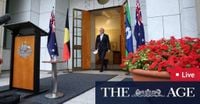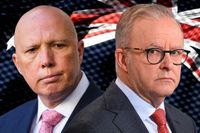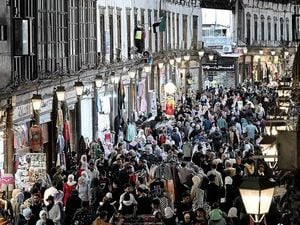In a heated political landscape, Peter Dutton, the leader of the Liberal Party, has directed sharp criticism at unions for their role in pushing the Labor government to expand the public service by an additional 41,000 positions. During a recent appearance on Brisbane’s 4BC radio, Dutton stated, "The public service union demanded that of the Labor government, so we’re paying $7 billion a year... the Labor Party will always ramp up the number of public servants because that’s the demand of the unions." This assertion comes in the wake of his party's campaign strategy as Australia gears up for the federal election on May 3, 2025.
The backdrop of Dutton's comments is a growing concern among Australians regarding the cost of living crisis, which has made many citizens wary of job cuts that could impact families. When pressed by host Bill McDonald about the implications of cutting jobs, Dutton emphasized the need for an efficient public service, stating, "These are Canberra-based bureaucrat jobs that we’re talking about. The public service does a great job, but we need to have an efficient public service." This rhetoric has sparked a debate about the balance between efficiency and employment in the public sector.
In a parallel development, Greens leader Adam Bandt has voiced his belief that a minority government is on the horizon, framing the upcoming election as a pivotal moment for Australia. Bandt remarked, "It is crystal clear after this week... that we can’t keep voting for the same two parties and expecting a different result." He encouraged voters to seize the opportunity to push for significant changes in addressing the housing crisis, the cost of living, and climate issues, asserting that "nothing changes if nothing changes." Bandt's comments reflect a growing sentiment among some voters that the traditional two-party system may no longer serve their interests.
Dutton's campaign also includes a strong focus on energy policy, where he has criticized Labor's renewables strategy, labeling it a "cruel con." He argued for a greater reliance on gas, insisting that increased supply would lead to lower prices. "We have to accept that the renewables aren’t working... the batteries only last a couple of hours, and we need gas in the system," he stated, suggesting that the Coalition's approach would better serve the energy needs of Australians.
As the election date approaches, Dutton has indicated that this is a critical moment for Australia, stating, "It’s an opportunity to change the government and to get our country back on track." He has promised that more detailed policies will be revealed in the coming weeks, underscoring his commitment to addressing pressing issues such as the economy and energy costs.
The Liberal Party has already launched its first campaign ad, which critiques current Prime Minister Anthony Albanese's tenure. The ad juxtaposes Albanese’s victory speech from the 2022 election with images of economic decline and emotional responses from citizens, culminating in Dutton asserting, "We live in the best country in the world, but right now, it’s at a turning point." This strategy aims to resonate with voters who may feel disillusioned with the current government.
In a notable moment during the campaign, Dutton reunited with Olympic diver Sam Fricker for an Instagram live session, marking a shift in how politicians engage with younger voters. This interaction highlights the increasing importance of social media as a tool for political communication, particularly among demographics that might not follow traditional news sources.
As the political landscape shifts, Dutton’s deputy, Bridget McKenzie, has responded to inquiries about the Coalition’s nuclear energy plans. She dismissed claims that Dutton is avoiding the topic, stating, "We’ve already announced that plan... [Nuclear] will actually set us up for energy security and lower bills into next century." However, critics are questioning the feasibility and funding of such ambitious projects, especially given Dutton's plan to cut 41,000 public sector jobs.
Labor's Murray Watt has countered Dutton's energy policies, asserting that the Coalition's gas reservation strategy would not deliver the cheapest energy solutions. He stated, "I think what most people are looking for is what is the solution to provide the cheapest forms of energy... the overwhelming evidence from the CSIRO... is that the best way to bring power prices down is through renewables." Watt's comments reflect a broader debate on how Australia should navigate its energy future amidst rising costs and environmental concerns.
Meanwhile, the Australian Electoral Commission has reported an unprecedented increase in voter registration, with 710,000 more people on the electoral roll since the last federal election. This surge suggests heightened political engagement as Australians prepare to make their voices heard in the upcoming election.
As the election campaign intensifies, various factions within the political landscape are mobilizing. The right-wing campaign group Advance has begun fundraising efforts, framing the election as a battle against what they describe as "radical extremists" in the Greens and a weak Labor government. This sentiment is indicative of the polarized political environment leading up to the election.
In the context of human rights, the Queensland Human Rights Commissioner has criticized the state government's rejection of recommendations from a recent human rights review. This decision has raised concerns about the treatment of marginalized communities and the government's commitment to addressing critical social issues.
As the election approaches, the stakes are high for all parties involved. With Dutton's aggressive campaign strategy, Bandt's push for change, and Labor's defense of its policies, voters will soon have the opportunity to shape the future of Australia. The outcome of the May 3 election will not only determine the direction of government policies but also set the tone for the political discourse in the years to come.






